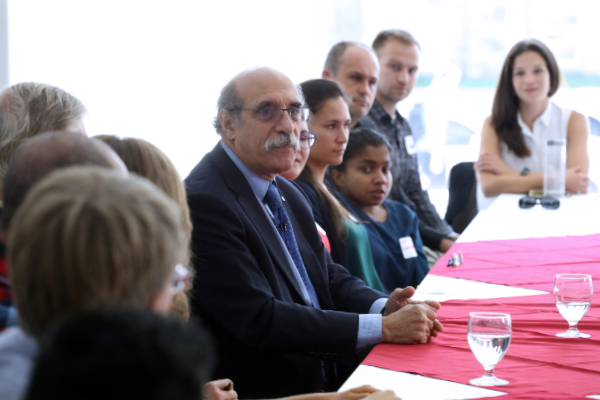Championing new thinking
October 2, 2019
Share

A group of Queen’s University’s most promising graduate students recently sat down with Nobel Prize Laureate Martin Chalfie, who shared his stories of achievement and failure in hopes of illuminating and inspiring their journeys toward research success.
Over 35 graduate students and post-doctoral researchers took part in an exclusive round table discussion with Dr. Chalfie during a visit to campus by the Nobel Prize Inspiration Initiative (NPII) – an international outreach program organized by Nobel Media and biopharmaceutical firm AstraZeneca that strives to connect Nobel Laureates with scientific and student communities at universities and research centres worldwide.
“As researchers, we know that all discovery and progress is built on the push and pull of failure and success,” says Fahim Quadir, Dean of the School of Graduate Studies, who introduced the round table discussion. “Advancement in science and society, and the creation of new knowledge, often begins with a leap in the dark, with the courage to risk failure simply in order to propel ourselves one step closer to the goals our research pursuits seek to advance.”
Students from over a dozen disciplines attended the candid, closed-door discussion, which touched on topics ranging from science communication and public perceptions of science, to mental health and multi-disciplinary approaches to research.
“The round table with Dr. Chalfie was enlightening and inspiring,” says Mandy Turner, a third-year PhD candidate and Vanier Scholar in the Faculty of Health Sciences’ Department of Biomedical and Molecular Sciences. “Being a graduate student can sometimes feel siloed, so it was comforting to have the opportunity to hear from an accomplished researcher like him, as well as my peers across the university who echoed many of my concerns about the future of science and science careers.”
One of the recurring anxieties expressed by those in attendance centred on a perceived shift in society’s attitude toward the merit of scientific knowledge.
“From time to time, I feel nervous about my pursuit of a career in science, since it seems like hard-earned results and evidence are less and less accepted by the public and policymakers,” says Matthias Hermann, who has just begun his third year as a PhD candidate in Chemistry. “When I expressed my worry to Dr. Chalfie during the round table he reminded us that throughout history there have always been people who deny facts and evidence, which has only served to underline the importance of scientists’ work. I really appreciated this response.”
Many of the round table participants also remarked on Dr. Chalfie’s charisma and candor.
“To have this person who achieved one of the highest honours of a research career be so humble and sincere about his life was very inspiring to me,” says Artur Sass Braga, PhD candidate in the Department of Civil Engineering. “He was so open about his initial failures in academia and shared with us that there is no secret formula or method to becoming a successful researcher. This perspective helps tremendously as it lessens the burden of the expectations graduate students can often feel are placed upon them.”
The round table preceded a sold-out NPII public event at the Isabel Bader Centre for the Performing Arts featuring Dr. Chalfie in conversation with award-winning journalist and author André Picard, Canada’s Chief Science Advisor Mona Nemer, and Queen’s own Nobel Laureate, Arthur B. McDonald. Both events also coincided with the launch of a new website highlighting Queen’s University’s vast complement of research pursuits and achievements, much of which involves Queen’s graduate researchers.
“The round table gathering was also about recognizing the enormous contributions our graduate students and postdoctoral fellows make to knowledge production; to championing new thinking and to uncovering groundbreaking discoveries,” says Dr. Quadir. “I am proud of our students and post-docs for their relentless efforts to advance new knowledge that serves the greater public good.”
Learn more about the Nobel Prize Inspiration Initiative event that took place at Queen’s on September 25, 2019, and view a video recording of our online Facebook Live broadcast of the event.